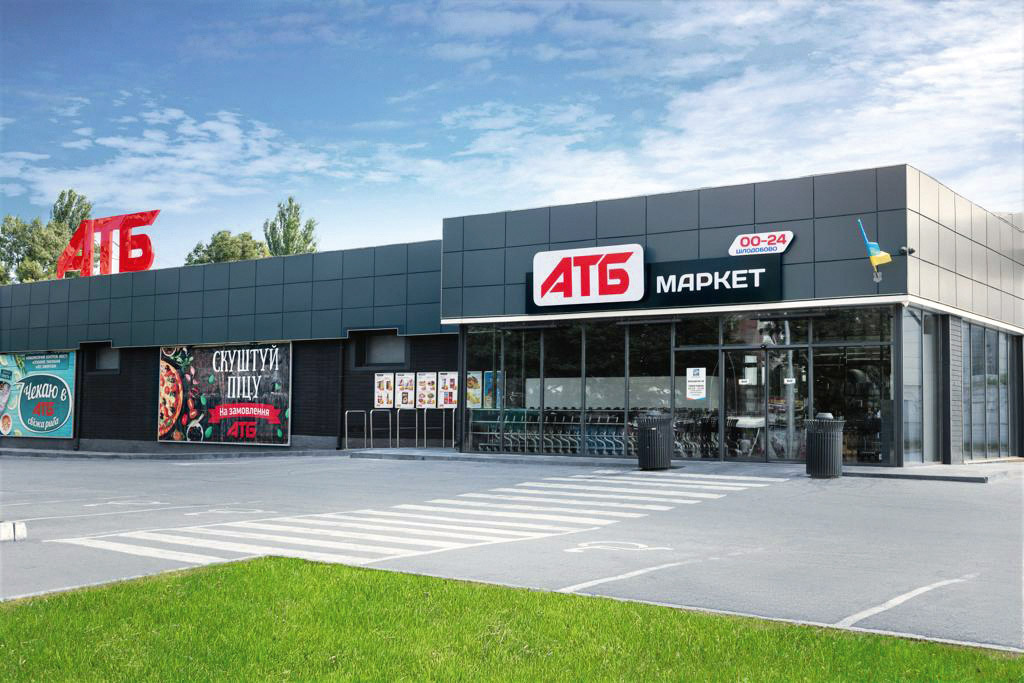As Ukraine’s largest retail chain, ATB Market has been at the forefront of the country’s civilian response to the full-scale invasion launched by Russia eighteen months ago. From the very first moments of the invasion on February 24, 2022, the entire ATB Corporation switched to a wartime footing and began working to support the defense of the country, playing an important role in safeguarding food security while also contributing to Ukraine’s economic resilience.
ATB made its first vehicle purchase for the Ukrainian Armed Forces on the second day of the invasion. This figure has since climbed to include more than one thousand vehicles including all-terrain trucks, tankers, and a wide range of cars. A similar number of drones have been handed over to the Ukrainian military, contributing to the country’s strategically important and rapidly expanding drone army. In addition to this support, ATB has also collected hundreds of tons of food and other basic necessities in stores across the country and sent these supplies to the front.
Managing a major retail chain in wartime conditions creates a whole series of unique practical challenges. During the initial stages of the full-scale Russian invasion, ATB officials found themselves confronted with disruption to everything from logistical chains and communications to infrastructure. The situation was further complicated by the lack of clarity among many partner producers and suppliers over the likely further development of events.
With any breakdown in supply chains to ATB Market stores across Ukraine having the potential to undermine food security for millions of civilians and spark a humanitarian disaster, ATB officials moved to deploy the company’s own fleet of more than 700 vehicles to handle distribution across the country. Meanwhile, with Ukraine’s Black Sea ports under Russian naval blockade, maritime imports were redirected to alternative ports in Romania and Turkey. In-house transport solutions were also employed to support overland imports from Poland and the Baltic states.
With some imports no longer readily available, ATB moved to expand the range of local suppliers and fill any gaps created by temporary logistical breakdowns. Since the start of Russia’s full-scale invasion, more than a hundred new agreements have been signed with domestic Ukrainian suppliers. This pragmatic pivot toward domestic suppliers has provided a powerful new impetus to the development of the local business climate while also boosting Ukraine’s wartime economy.
The ATB response to the Russian invasion has also impacted the way the company operates internally, with steps implemented to speed up decision-making and delegate authority as much as possible. This led to a significant streamlining of management processes, with issues that would typically have taken weeks to resolve during peacetime now often addressed within a matter of just a few hours. Measures were also adopted for a number of worst-case scenarios, including the establishment of reserve offices in the western regions of Ukraine in case the security situation made emergency relocation necessary.
ATB stores have long played a prominent role within local communities, and this has never been more the case than during the past eighteen months since the onset of Russia’s full-scale invasion. First and foremost, stores have been a source of food and other everyday essentials, and have often continued to operate in close proximity to the front lines of the war. There have even been a number of instances when ATB store basements have served as bomb shelters for customers during Russian air raids.
With the Ukrainian banking system facing unprecedented logistical challenges, ATB stores have stepped in to help out by providing customers with the opportunity to withdraw cash directly from store cash registers. Meanwhile, when Russia’s targeted bombing campaign of Ukraine’s civilian energy infrastructure led to regular blackouts during the autumn and winter months, ATB stores offered people the chance to warm up, access the internet, and charge up their smartphones, flashlights, and other gadgets.
The supermarket chain has also been among the first major Ukrainian brands to resume operations in areas of Ukraine liberated from Russian occupation. This has consistently been the case for the past year-and-a-half in Kyiv region, Kharkiv region, Chernihiv region, and Kherson region. Areas that suffered particularly devastating damage including Kupyansk in Kharkiv region and Snihurivka in Mykolaiv region have received thousands of free food kits.
As part of the company’s response to the Russian invasion, ATB has initiated a number of charity projects focused on collecting humanitarian aid and funds to support the Ukrainian Armed Forces and the country’s territorial defense units. The total amount of aid donated by the company to both the military and the Ukrainian civilian population is over UAH 500 million and continues to grow on a daily basis.
Crucially, ATB has contributed to the stabilization of the Ukrainian economy as one of the country’s key private sector taxpayers. During the first year of the war, ATB paid UAH 20.44 billion in tax to the state, representing almost half of all contributions from the Ukrainian retail industry. This data point is even more exceptional as it represents an almost UAH 1 billion increase on the previous year’s total. There are indications that this positive trend will continue, with tax payments already up by UAH 2.22 billion year-on-year during the first six months of 2023.
